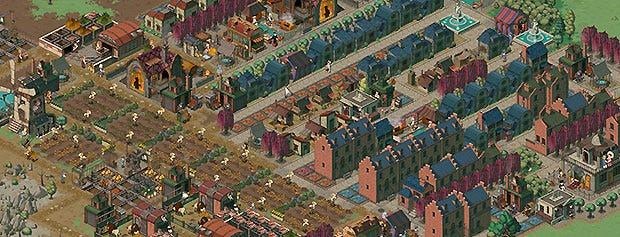Wot I Think - Lethis: Path Of Progress
Re-hail Caesar
As the doors of game development open up to more and more souls, an added benefit is that it's ever-more plausible to make some great art then slap it into your engine, elevating the functional into the beautiful. Caesar/Zeus/Pharaoh-inspired, combat-free Gallic citybuilder Lethis: Path Of Progress doesn't do especially remarkable things in terms of town management, but with an animation-inspired, gently Steampunk art style which falls somewhere in between bande dessinee and Studio Ghibli, it's too gorgeous to put down even when it's on the verge of tedium.
The isometrically-presented, 2D Lethis comes from the provision of services and meticulous route-planning school of city-building thought rather than the capitalism simulator side of things. You're trying to keep your citizens happy in order that they upgrade their own homes, and that entails a laundry list of construction - food, laundry, utensils, medicine, all the way up to towering cafes staffed by steam-powered automatons. Everything you build needs highly efficient road connections and nearby maintenance buildings to stop it all falling down, and you also need to worry about plentiful tax offices and exorcists to, er, keep all the ghosts out. It's a pretty fast'n'loose Steampunk/fantasy fiction, far more interested in charm than explicability, and it's absolutely the right choice for the game: I fear Lethis would have been desperately dry otherwise.
The upgrade cycle is endearing for a time, as the pay-off is fancier houses and more varieties of ostentatiously-behatted workers patrolling the streets, but for me it became routine. Any significant expansion of your housing areas involves either placing one (or more) of everything all over again or some extremely meticulous road-planning to ensure workers' routes are tight loops, and usually both. If you want Lethis to be a timesink first and foremost it absolutely delivers, but it's much more about staying the course than experimental city-design or even crisis-management. There is creativity for sure, as you draw mazes of houses adorned with trees and benches and parks (though decoration primarily serves the purposes of keeping townsfolk happy), and your time and dedication investment is rewarded with enormous special buildings and a slow, gratifying spread across the landscape, but expect maintenance more than drama.
I alternated between revelling in its relatively pressure-free prettiness and looking forlornly at everything I had to yet to build, knowing how many more maintenance buildings, little parks, storehouses and of course food I'd have to build were I to have the population to support it all. These weren't things I needed to figure out or even especially work for, but simply routines to perform. This was all the more acute in campaign mode, where it throws demands for e.g. large resource tributes to the king or fixed expansion goals into the mix, which feel more like chore than achievement. I much preferred sandbox mode, left free to figure it out and expand at my own pace.
The prettiness is a double-edged sword too. Thanks to its healthy smattering of visual invention, Lethis' animation style looks wonderful, managing to stay on the right side of twee despite child-like character models and a society in a state of eternal contentment. But this conceals a lack of life: the workers are the only souls you see, and they lack names or desires of their own, just pretty automatons performing endless circuits around their corner of town. It's a brief joy to watch the animations on each new structure you place, but then the clockwork loops become apparent and the spell is broken. No-one lives, no-one dies, all is puppetry. Despite the uncommonly characterful presentation, there's no escaping that Lethis is simply a machine.
Many other city-builders are machines too, of course, and Lethis is to be admired both for the inventive appearance and for being achieved by a tiny team. It's in the shadow of more ambitious, and unforgiving, one-man-show Banished in the latter regard, but even so, for the most part it looks and feels high-quality.
Not entirely so, however. It's launched in a pretty buggy state, which the devs have been more than apologetic about, but there've been a couple of patches already and it's significantly more robust now than it was the first time I tried it. Unfortunately English-speakers especially will still find the mangled translation pretty damn distracting, especially as the text is heavy on incoherent gags. Another good reason to stick to sandbox mode, which is altogether less talky. Limited camera controls and a UI which can't always read which building you clicked on create mild practical frustrations too, but mild they definitely are.
I know I keep throwing around the word 'charm', but if you're not a die-hard Impressions Games fan, charm is absolutely the main reason to play Lethis. What's beneath the pseudo hand-drawn Gallc style is somewhat functional, more a straight climb up the tech tree than a true sandbox, but of course that's consciously serving a certain mindset's need, and I suspect those people will be absolutely delighted by its mechanical precision. As much as I might personally mourn its clockwork nature, it is intended to be clockwork, and it's very much meeting its promises.
That said, it doesn't at all feel throwback: though simple, Lethis comes across as modern and thoughtful, not chained to nostalgia. I've enjoyed my time with it for the most part, but I'm ready to part company with it now: I feel I've seen everything and any revisit would simply be repetition. I'd love to see its art approach applied to something a little more organic, though.
Lethis: Path Of Progress is out now.













